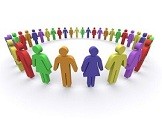Neurodiversity vs Disorder: The Other Great Divide of Autism

With all of the attention the autism-vaccine debate has received, often overlooked is another source of infighting within the autism community that involves neurodiversity vs. disorder. Neurodiversity is a movement commonly seen among those with high functioning autism and adheres to the notion that people with autism experience the world differently, not pathologically. As such, they are not looking to be “cured” and advocate for greater acceptance and awareness for themselves and others who are “different.”
Ari Ne’eman is the director of The Autistic Self-Advocacy Network and a strong advocate for neurodiversity. His organization’s mission statement reads:
ASAN seeks to advance the idea of neurological diversity, putting forward the concept that the goal of autism advocacy should not be a world without Autistic people. Instead, it should be a world in which Autistic people enjoy the same access, rights and opportunities as all other citizens. Working in fields such as public policy, media representation, research and systems change, ASAN hopes to empower Autistic people across the world to take control of their own lives and the future of our common community. Nothing About Us, Without Us!
Mr. Ne’eman (aged 22) has Asperger’s Syndrome and on December 16, 2009, was appointed by President Barack Obama to serve on the National Council on Disability, the first person with an autism spectrum disorder to do so. However, his Senate confirmation unleashed a firestorm and even death threats against him.
Ne’emen’s outraged opponents contend that treating autism as an alternate way of “being” rather than a debilitating condition will reduce research and funding for finding a cure. Simply put, children with low functioning autism don’t have the luxury of joining an “autism pride” movement and parents worry about the negative effects this type of attention will have on their children’s futures.
Andrew Solomon, author of “The Noonday Demon,” actually sees three sides to the debate: those who believe autism is caused by environmental toxins (particularly vaccines), those who believe autism is genetic and those who contend autistics are neurodiverse and feel they should be left alone.
There is a real fear by many that the heredity model will take precedence and lead to eugenics as more and more parents opt to abort
fetuses with a chromosome marker for autism, following the path of Down Syndrome where approximately 92% of all diagnosed fetuses are aborted. Do we really want to prevent the birth of the next Temple Grandin?
As for the neurodiversity movement, there is heated debate of whether or not it can exist without impinging upon the quest for a cure to autism. Perhaps the answer lies with taking into consideration the messages from all groups. Most likely, heredity establishes a predisposition to autism, while environmental factors produce triggers.
Impartial research into the safety of our current vaccine schedule and other drugs such as obstetric and birth control medications should be given priority, as well as the elimination of mercury and other toxic substances from our general environment. Geneticists should continue to unlock the mysteries of the genome, which can’t help but to expand our understanding of autism. Additionally, high functioning individuals should continue to galvanize their autism civil rights movement.
I recall my high functioning son being asked to write a two-page essay in school about what it’s like to have a disability and he summed it up in a single sentence, “It’s like having brown eyes.” To have reached that level of self-acceptance after all he had been through was nothing short of amazing.
No one can deny the tragedy of a child with autism who is self injurious, nor a high functioning young person who has “aged out” of their support systems and is cast adrift into a neurotypical world.
The key is for all segments of the autism community to keep working on finding common ground so that the future is brighter for all of our children.

